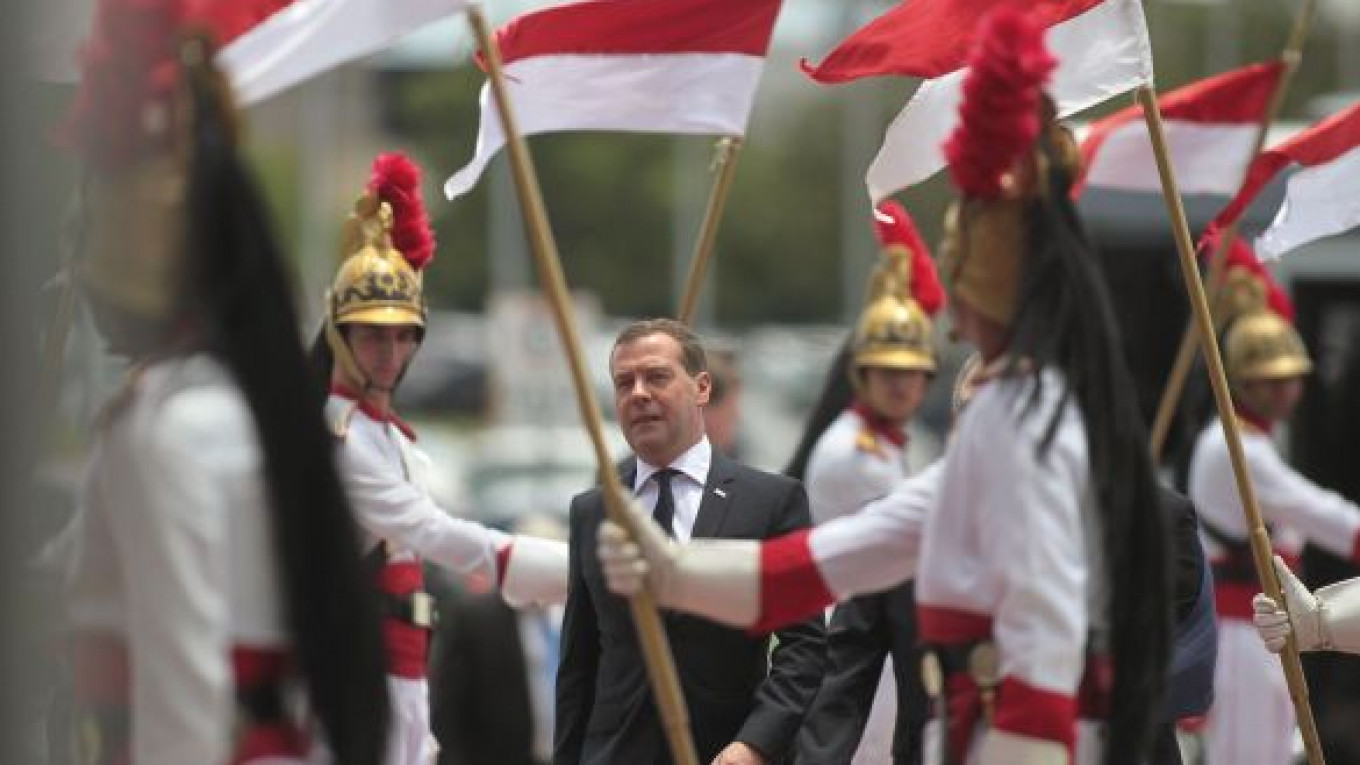Russian Prime Minister Dmitry Medvedev met with Brazilian President Dilma Rousseff on Wednesday on a visit to Brazil aimed at sealing defense and nuclear technology deals with a fellow member of the BRICS bloc of emerging nations.
On their agenda was the possible sale of Russian anti-aircraft missile systems to Brazil, a Brazilian government spokesman said.
Brazil is beefing up its air defenses ahead of the World Cup soccer tournament next year and the 2016 Olympic Games to ward off the threat of a terrorist attack during the global sporting events, which will draw massive crowds of foreigners.
Medvedev's trip follows a visit by Rousseff to Moscow in December that underlined the importance both countries attach to building relations among the BRICS club of emerging economies.
The BRICS countries — Brazil, Russia, India, China and South Africa — have a combined GDP of $14.9 trillion and have become increasingly vocal in criticizing developed nations' hold over global economic policies.
Ties between Brazil and Russia have been strengthening and they want to raise annual trade turnover to $10 billion from the current $6.5 billion.
Moscow will tout its advanced energy expertise and technology aiming to get involved in Brazil's plans to build new nuclear power stations to meet surging demand for electricity that has overwhelmed its generating capacity.
"We would like to offer our participation in the construction of nuclear plants and would like to get an invitation to participate in [the upcoming] tender," a senior official in the Russian delegation said.
He said Russia could train Brazil's nuclear staff, design research reactors and supply fuel for the future plants.
Medvedev also will try to clinch the sale of Russia's anti-aircraft missile technology, including the Pantsir S1 combined missile and artillery system and Igla-S portable surface-to-air missiles.
Brazil is interested in buying three Pantsir batteries with medium-range missiles and wants to acquire the technology to build the missiles itself in the future.
"We have already signed a commercial protocol on Igla-S supplies, which also foresees the opportunity of licensed production, but talks are ongoing," the Russian official said. "Licensed production launch may take some time, so they have expressed interest in importing Igla-S in the meantime too."
Russia is the world's second largest arms exporter and a deal with Brazil would largely be seen as a symbolic penetration of the Latin American defense market, after Russia lost some key contracts due to the Arab Spring uprisings in the Middle East.
Medvedev also will discuss the possible increase of Brazilian meat supplies to Russia, its largest buyer, the official said, but Moscow's sanitary authorities will make sure it is compliant with all the necessary standards.
As a sign of the two countries drawing closer, Brazil on Tuesday became the first country outside Russia to host a monitoring station for the Russian satellite navigation system GLONASS, a global positioning system that uses 24 satellites.
Medvedev also will visit Cuba, a former Cold War-era ally, where Moscow expects to sign deals on medicine, space and aviation, and possibly including deals on the supply to Havana of three Ukrainian-Russian Antonov-158 regional jets.
Related articles:
A Message from The Moscow Times:
Dear readers,
We are facing unprecedented challenges. Russia's Prosecutor General's Office has designated The Moscow Times as an "undesirable" organization, criminalizing our work and putting our staff at risk of prosecution. This follows our earlier unjust labeling as a "foreign agent."
These actions are direct attempts to silence independent journalism in Russia. The authorities claim our work "discredits the decisions of the Russian leadership." We see things differently: we strive to provide accurate, unbiased reporting on Russia.
We, the journalists of The Moscow Times, refuse to be silenced. But to continue our work, we need your help.
Your support, no matter how small, makes a world of difference. If you can, please support us monthly starting from just $2. It's quick to set up, and every contribution makes a significant impact.
By supporting The Moscow Times, you're defending open, independent journalism in the face of repression. Thank you for standing with us.
Remind me later.






